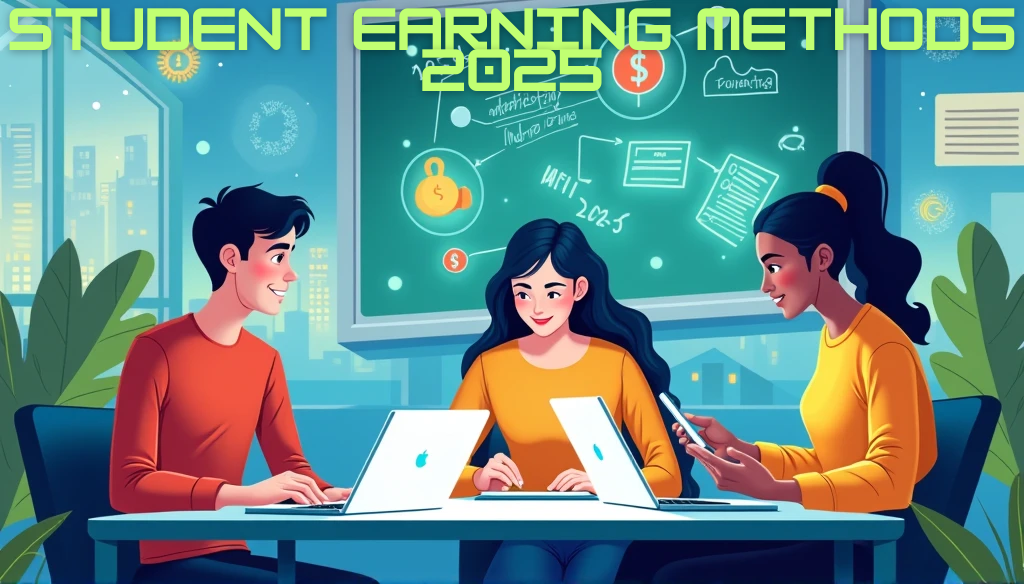Innovative Ways to Monetize Skills, Knowledge, and Creativity
In 2025, students no longer need to wait until graduation to start earning. With the gig economy booming, AI reshaping industries, and remote work becoming the norm, education skills like critical thinking, technical expertise, and creativity are now valuable currencies. This guide explores student earning methods 2025 that align with academic strengths, ensuring financial independence while building career-ready experience.
Why Education Skills Are Your Greatest Asset in 2025
The job market is evolving faster than ever, and employers prioritize candidates who can apply knowledge practically. Here’s why students should start monetizing their skills now:
- Financial Freedom: Earn while learning to reduce student debt.
- Skill Validation: Prove your expertise to future employers.
- Adaptability: Stay ahead in fields like AI, sustainability, and digital content.
Top 7 Student Earning Methods for 2025
Leverage your coursework, hobbies, and tech-savviness with these strategies:
1. Freelancing in High-Demand Fields
Platforms like Upwork and Fiverr let students monetize skills like:
- Academic Writing & Editing: Charge 20–50/hour for essays, research papers, or thesis proofreading.
- Coding & App Development: Build websites or automate workflows for small businesses (30–80/hour).
- Graphic Design: Create logos, social media content, or infographics for startups.
Example: A computer science student earned $5,000 in 3 months by developing WordPress sites for local retailers.
2. Content Creation & Digital Education
Turn your knowledge into passive income:
- YouTube Tutorials: Explain complex subjects (e.g., coding, calculus, or language learning). Monetize via ads or sponsorships.
- Online Courses: Use platforms like Udemy or Teachable to sell courses on niche topics (e.g., Python for beginners).
- Educational Blogging: Write SEO-optimized articles on trends like AI ethics or green tech.
Case Study: A finance student’s TikTok series on stock trading gained 200K followers, leading to paid partnerships with investment apps.
3. Remote Internships & Micro-Jobs
Companies now hire students for project-based roles:
- Data Analysis: Use Python or Excel to analyze trends for startups (15–30/hour).
- Virtual Assistance: Manage emails or social media for entrepreneurs.
- Research Assistance: Help NGOs or academics with fieldwork or data collection.
4. Selling Creative Work
Monetize assignments and hobbies:
- Digital Art & Design: Sell templates, photography, or illustrations on Etsy or Creative Market.
- Music & Writing: License original music on Spotify or publish short stories on Medium’s Partner Program.
5. Tech-Driven Side Hustles
- AI Prompt Engineering: Train AI models or craft prompts for tools like ChatGPT (25–60/hour).
- E-commerce: Launch a dropshipping store or sell custom merch via Shopify or Redbubble.
6. Tutoring & Mentorship
Use platforms like Chegg or Wyzant to:
- Tutor peers in STEM subjects (20–40/hour).
- Mentor high school students on college applications.
7. Sustainability Consulting
With climate action gaining urgency:
- Advise small businesses on reducing carbon footprints.
- Create content on sustainable practices for brands.
Tools & Platforms Dominating 2025
- Freelancing: Upwork, Fiverr, Toptal
- Content Creation: YouTube, TikTok, Patreon
- Education: Coursera, Skillshare, Kajabi
- E-commerce: Shopify, Etsy, Printful
How to Maximize Earnings: 5 Actionable Tips
- Identify Your Niche: Focus on high-demand skills (e.g., AI literacy, cybersecurity, or ESG reporting).
- Build a Portfolio: Showcase projects on LinkedIn or a personal website.
- Leverage Automation: Use AI tools like Canva or Grammarly to save time.
- Network Strategically: Join student freelancer groups or LinkedIn communities.
- Stay Trend-Aware: Follow emerging fields like Web3, quantum computing, or green tech.
Common Mistakes to Avoid
- Undervaluing Skills: Research market rates—don’t accept underpaid gigs.
- Ignoring Taxes: Track earnings and set aside 20–30% for taxes.
- Overcommitting: Balance work with academics to avoid burnout.
Conclusion: Education as a Gateway to Financial Independence
In 2025, students have unprecedented opportunities to turn education into income. Whether through freelancing, content creation, or tech innovation, the key is to start small, stay curious, and align your skills with market needs. By doing so, you’ll not only earn money but also build a resume that stands out in a competitive world.
Ready to start? Pick one method from this guide, take the first step, and let your education fuel your financial future.
